仁爱版英语九年级考点与练习
- 格式:doc
- 大小:171.50 KB
- 文档页数:13

Unit1Ⅰ.词汇。
(10分)(A) 根据句意及汉语提示完成句子。
1.I’ve ________ (已经) read the book twice.2.In the past, my grandparents couldn’t afford an ________(教育) for my father.3.________ (尽管) life is hard for her, she is still happy.4.They are ________ (考虑) buying a new house.5.China has ________ (发展) rapidly in recent years.(B) 根据句意及首字母提示补全单词。
6.Don’t worry. I have made much p_____ in learning English.7.—Has she made r_____ progress in her study?—Yes, she has.8.I’m sure you’ll s_____ if you work hard.9.Miss wang asked the students to write a 400-word c_____ about Autumn.10.Can you d_____ it in detail?Ⅱ.英汉互译。
(5分)11.我一直与大学时代的朋友保持联系。
I _____ _____ _____ _____ my friends from college all the time.12.我哥哥去游泳了。
My brother has _____ _____.13.在过去的十年我们国家取得了巨大进步。
Our country has _____ great _____ in the past ten years.14.我虽然没时间去旅游,但是仍然觉得这个假期很愉快。
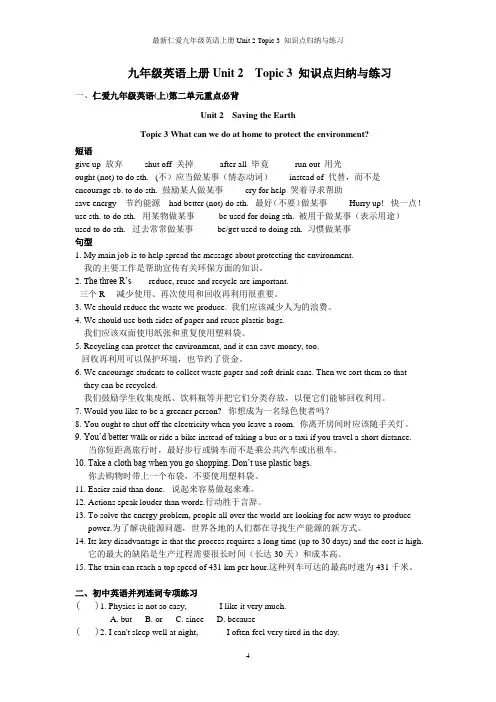
九年级英语上册Unit 2 Topic 3 知识点归纳与练习一、仁爱九年级英语(上)第二单元重点必背Unit 2 Saving the EarthTopic 3 What can we do at home to protect the environment?短语give up 放弃shut off 关掉after all 毕竟run out 用光ought (not) to do sth. (不)应当做某事(情态动词)instead of 代替,而不是encourage sb. to do sth. 鼓励某人做某事cry for help 哭着寻求帮助save energy 节约能源had better (not) do sth. 最好(不要)做某事Hurry up! 快一点!use sth. to do sth. 用某物做某事 be used for doing sth. 被用于做某事(表示用途)used to do sth. 过去常常做某事be/get used to doing sth. 习惯做某事句型1. My main job is to help spread the message about protecting the environment.我的主要工作是帮助宣传有关环保方面的知识。
2. T he three R’s------reduce, reuse and recycle are important.三个R----减少使用、再次使用和回收再利用很重要。
3. We should reduce the waste we produce. 我们应该减少人为的浪费。
4. We should use both sides of paper and reuse plastic bags.我们应该双面使用纸张和重复使用塑料袋。
5. Recycling can protect the environment, and it can save money, too.回收再利用可以保护环境,也节约了资金。
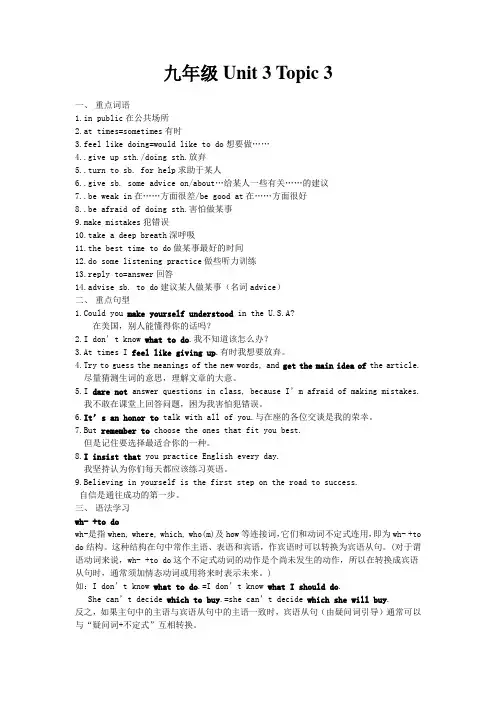
九年级Unit 3 Topic 3一、重点词语1.in public在公共场所2.at times=sometimes有时3.feel like doing=would like to do想要做……4..give up sth./doing sth.放弃5..turn to sb. for help求助于某人6..give sb. some advice on/about…给某人一些有关……的建议7..be weak in在……方面很差/be good at在……方面很好8..be afraid of doing sth.害怕做某事9.make mistakes犯错误10.take a deep breath深呼吸11.the best time to do做某事最好的时间12.do some listening practice做些听力训练13.reply to=answer回答14.advise sb. to do建议某人做某事(名词advice)二、重点句型1.Could you make yourself understood in the U.S.A?在美国,别人能懂得你的话吗?2.I don’t know what to do.我不知道该怎么办?3.At times I feel like giving up.有时我想要放弃。
4.Try to guess the meanings of the new words, and get the main idea of the article.尽量猜测生词的意思,理解文章的大意。
5.I dare not answer questions in class, because I’m afraid of making mistakes.我不敢在课堂上回答问题,困为我害怕犯错误。
6.It’s an honor to talk with all of you.与在座的各位交谈是我的荣幸。

九年级上U n i t1t o p i c1复习提纲一、重点短语1.take place 发生;进行2.have/has been to去过3.have/has gone to 去....未回来4.learn ...from向...学习5.put o n 举行;穿上6.a group of 一群7.keep in touch with 保持联系8.far away 遥远9.satify sb’s needs 满足某人的需求10.make progress 取得进步11.succeed in doing sth 成功做某事12. In one’s spare time 在某人的业余时间13. in recent years近几年二1. Great changes have taken place there…此句是现在完成时,表示在说话之前已发生或完成的动作对现在造成的影响或结果。
其结构是“助动词have/has+动词的过去分词”。
e.g. I have finished that work. 我已经完成了那项工作。
She has bought a new bike. 她买了一辆新自行车。
2. have/has been to...去过……。
e.g. He has been to Hubei. 他去过湖北。
(人已不在湖北,表示有此经历,曾经去过那里。
)I have been to Beijing several times. 我去过北京几次。
3. have/has gone to...已经去了,它强调主语此时不在说话地点。
e.g. She has gone to Shanghai. 她已经去了上海。
注意:区分have/has been to和have/has gone to的用法。
4. so...that... 如此……以至于……,引导结果状语从句。
e.g. He ran so quickly that we couldn't keep up with him.他跑得很快,我们都赶不上。

仁爱英语九年级上Unit1单元重点知识复习及练习题1. take place 发生eg: Great changes have tanken place in my hometown.2.Though I had no time to travel, I still felt very happy this holiday! 尽管我没时间去旅游,但这个假期我仍然感到很愉快。
though 从属连词,用来引导让步状语从句,表“虽然;尽管”,不能与but连用。
如:Though he is poor, he is happy. = He is poor, but he is happy. 尽管他很贫穷,但是他很快乐。
3.Could you please tell me something about Chinese teenagers? 请告诉我一些有关中国青少年的一些事情好吗?Could /Would you please (not) do sth?请(不)做某事好吗?eg: Could you please turn down your radio? 请把收音机声音调低好吗?Would you please not play football here? 请不要在这儿踢球好吗?4.Parents couldn’t afford education for their children. 父母供不起孩子上学。
afford 常与can, could 或be able to 连用,尤其用于否定句或疑问句,表“负担得起(做)某事;抽得出(时间)”“(can’t/ couldn’t) afford (to do) sth.”eg: We can’t afford (to buy ) this house because we don’t have enough money. 我们买不这房了,因为我们没有足够的钱。

仁爱版九年级u n i t单元语法知识点总复习有对应习题及答案LEKIBM standardization office【IBM5AB- LEKIBMK08- LEKIBM2C】九年级英语Unit1单元归纳复习及相应课堂习题(含每个topic作文)1. Have/has been to, have/has gone to 和 have/has been in的区别主语+have/has been to + 地点“去过某地”(已返回)1 主语+have/has gone to +地点“去了某地”(未回来)主语+have/has been in +地点+for +段时间(待在某地,动作可以延长一定时间,后面常接段的时间)She has been in Japan for 2 year.She has been to Japan. She has gone to Japan.▲地点是名词须接to ,如果地点是副词则不接to。
Tom has been there.▲对地点提问用:where2.频度副词already,yet ,just,ever,never,在现在完成时中的作用3.4.(1)already 用在肯定句,用与句中,句尾均可,“已经”5.I’ve finished my homework already. I’ve already finished my homework .6.(2)yet 用于否定句或疑问句,“还”,用于句末。
在现在完成时的用法中,肯定句常用already,改用否定句和一般疑问句时常把already改为 yet(放句末)。
I have already found him.Have you found him yet(3)Just位于谓语动词前。
“刚刚”(也可以用于一般现在时,过去时态) He has just come back from France.(4) ever 多用与一般疑问句,否定句和条件状语从句中,“曾经”Have you ever been to France No, I haven’t. /Yes,I have.If you ever happen to come here ,be sure to visit us.(5)never 多用于否定的陈述句中,“从不……” (反义词是ever)I have never travelled on a plane.(变成一般疑问句)Have you ever travelled on a plane?He is never late for school. (它还可以用于其他时态中)(6)before 做副词时,”从前“,句中谓语常用现在完成时和过去时。
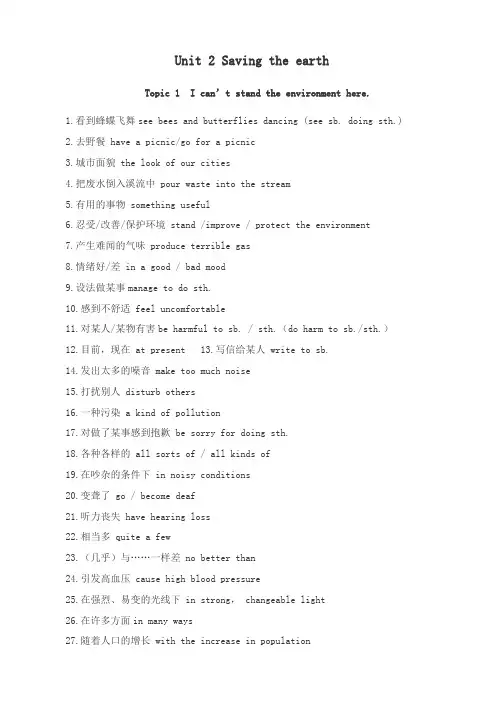
Unit 2 Saving the earthTopic 1 I can’t stand the environment here.1.看到蜂蝶飞舞see bees and butterflies dancing (see sb. doing sth.)2.去野餐 have a picnic/go for a picnic3.城市面貌 the look of our cities4.把废水倒入溪流中 pour waste into the stream5.有用的事物 something useful6.忍受/改善/保护环境 stand /improve / protect the environment7.产生难闻的气味 produce terrible gas8.情绪好/差 in a good / bad mood9.设法做某事manage to do sth.10.感到不舒适 feel uncomfortable11.对某人/某物有害be harmful to sb. / sth.(do harm to sb./sth.)12.目前,现在 at present 13.写信给某人 write to sb.14.发出太多的噪音 make too much noise15.打扰别人 disturb others16.一种污染 a kind of pollution17.对做了某事感到抱歉 be sorry for doing sth.18.各种各样的 all sorts of / all kinds of19.在吵杂的条件下 in noisy conditions20.变聋了 go / become deaf21.听力丧失 have hearing loss22.相当多 quite a few23.(几乎)与……一样差 no better than24.引发高血压 cause high blood pressure25.在强烈、易变的光线下 in strong, changeable light26.在许多方面in many ways27.随着人口的增长 with the increase in population28.随着工业的发展with the development of industry29.对我来说很难呼吸 It is difficult for me to breathe.30.你处于这样的状态多久了? How long have you been like this?自从上个月以来我一直这样。
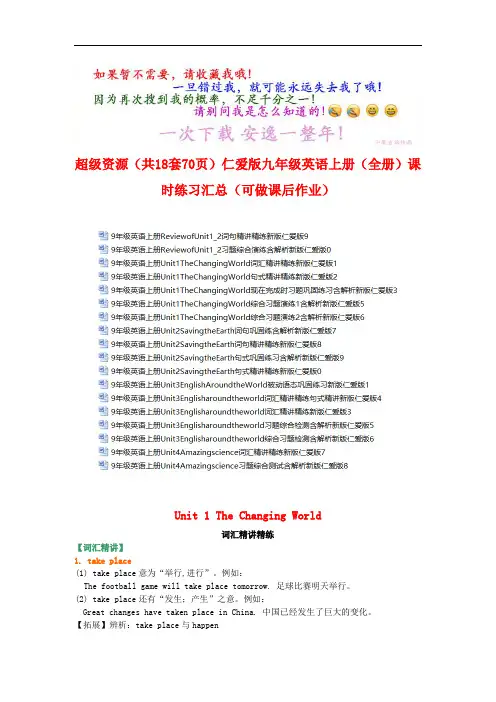
超级资源(共18套70页)仁爱版九年级英语上册(全册)课时练习汇总(可做课后作业)Unit 1 The Changing World词汇精讲精练【词汇精讲】1. take place(1) take place意为“举行,进行”。
例如:The football game will take place tomorrow. 足球比赛明天举行。
(2) take place还有“发生;产生”之意。
例如:Great changes have taken place in China. 中国已经发生了巨大的变化。
【拓展】辨析:take place与happen(1) take place 表示“发生、举行、举办”, 一般指非偶然性事件的“发生”, 即这种事件的发生一定有某种原因或事先的安排。
例如:When will the wedding take place? 婚礼什么时候举行?(2) happen作“发生、碰巧”解, 一般用于偶然或突发性事件。
例如:What happened to you? 你发生了什么事?(一般不说:What did you happen?)【注意】happen 与 take place 通常都没有被动语态。
2. by the wayby the way意为“顺便说一下”。
在句中作插入语, 用逗号隔开。
例如:By the way, have you seen Harry recently?顺便说一句, 你最近见过哈里吗?【拓展】(1) in the way意为“挡路”。
例如:Sorry, you are in the way. 对不起, 你挡路了。
(2) in this way意为“用这种方法”。
例如:In this way, he has collected a great many stamps。
用这种方法他收集了大量的邮票。
(3) on the way 意为“在去某地的路上”。

Unit 1 Topic 1一、重点短语1. feel sorry for …同情2. learn … from习3. in the past/ future将来4. in detail5. have no chance to do sth. 某事6. afford ( to do) sth某事7. give support to sb.支持8. with the development of 展9. sleep in the open air对……深表从……当中学在过去/ 在详细地没有机会做担负得起(做)给某人帮助/ 随着……的发在户外睡觉10. used to do sth.某事11. fall ill得病/ 患病12. divide …into …把... 分成……13. thanks to 多亏; 幸亏;由于14. with the help of …在……的帮助下、重点句型1. Parents couldn 't afford education for their children. 父母供不起孩子上学。
afford 常与can, could 或be able to 连用,尤其用于否定句或疑问句,表“负担得起(做)某事;抽得出(时间)”“(can 't/ couldn 't) afford (to do) sth. ”2. Our government gives support to poor families. 我们的政府能为贫困家庭提供帮助。
give support to sb.= give sb. support 为某人提供帮助/ 支持search sp. for sth. 搜查某地寻找某物support 作动词时表“供养;支持;支撑”3. Why not go and search the Internet for some information?为什么不上网查找相关信息呢?search sp. for sth. 搜查某地寻找某物search sb. for sth. 搜身查找某物search for sth./ sb.= look for sth./ sb. 搜寻某物/ 某人;4. One part was used to help support my family, to help send my elderbrother to school. 一部分钱用来供养全家人, 另一部分用来供哥哥上学.a) one part …the other (part) ------------ 部分 .... 另一部分 ....b) elder brother 哥哥elder 作形容词时, 是old 的比较级, 一般表示家庭成员出生的顺序, 在句中只能作定语, 可与than 连用; 而older 表年龄的比较, 可与than连用.5. sth. happen to sb. 某人发生了某事三、重点语法(一)现在完成时:表示过去已经发生或已经完成的某一动作对现在造成的影响或结果。
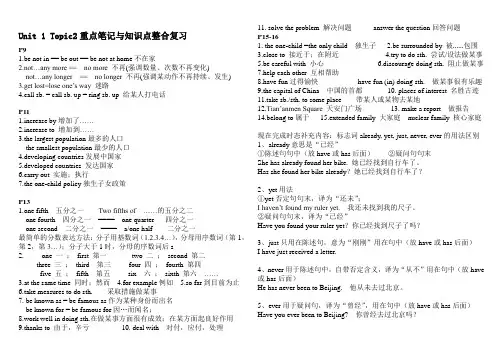
Unit 1 Topic2重点笔记与知识点整合复习P91.be not in == be out == be not at home不在家2.not…any more == no more 不再(强调数量、次数不再变化)not…any longer == no longer 不再(强调某动作不再持续、发生)3.get lost=lose one’s way 迷路4.call sb. = call sb. up = ring sb. up 给某人打电话P111.increase by增加了……2.increase to 增加到……3.the largest population最多的人口the smallest population最少的人口4.developing countries发展中国家5.developed countries 发达国家6.carry out 实施;执行7.the one-child policy独生子女政策P131.one fifth 五分之一Two fifths of ……的五分之二one fourth 四分之一==== one quarter 四分之一one second 二分之一==== a/one half 二分之一最简单的分数表达方法:分子用基数词(1.2.3.4…),分母用序数词(第1,第2,第3…);分子大于1时,分母的序数词后s2. one 一;first 第一two 二;second 第二three 三;third 第三four 四;fourth 第四five 五;fifth 第五six 六;sixth 第六……3.at the same time 同时;然而4.for example例如5.so far到目前为止6.take measures to do sth. 采取措施做某事7. be known as = be famous as作为某种身份而出名be known for = be famous for因…而闻名;8.work well in doing sth.在做某事方面很有成效;在某方面起良好作用9.thanks to 由于,辛亏10. deal with 对付,应付,处理11. solve the problem 解决问题answer the question回答问题P15-161. the one-child =the only child 独生子2.be surrounded by 被......包围3.close to 接近于;在附近4.try to do sth. 尝试/设法做某事5.be careful with 小心6.discourage doing sth. 阻止做某事7.help each other 互相帮助8.have fun过得愉快have fun (in) doing sth. 做某事很有乐趣9.the capital of China 中国的首都10. places of interest 名胜古迹11.take sb./sth. to some place 带某人或某物去某地12.Tian’anmen Square 天安门广场13. make a report 做报告14.belong to属于15.extended family 大家庭nuclear family 核心家庭现在完成时态补充内容:标志词already, yet, just, never, ever的用法区别1、already意思是“已经”①陈述句句中(放have或has后面)②疑问句句末She has already found her bike. 她已经找到自行车了。

[主题教材互译]Unit 6 Entertainment and Friendship娱乐和友谊Topic 3 I will remember our friendship forever.我永远也不会忘记我们的友谊Section CGraduation Ceremony毕业典礼A graduation ceremony is a custom which takes place when students graduate from a school.(毕业典礼是学生毕业时会举行的惯例。
)The ceremony is usually held in a big hall or in the open air.(典礼通常在大厅内或露天举行。
)During the ceremony, it is common for several students to give speeches,(在毕业典礼上,通常会有学生发言,)and so do the principal and some teachers.(校长和其他老师也会讲话。
)Then each graduate receives a diploma.(然后每位学生接受学位。
)It showsthat the student has successfully completed all the courses or has passed theexaminations.(这表明学生成功地完成了所有课程或者通过了所有考试。
)After the ceremony, students often chat with their teachers, friends and relativeswho come to congratulate them.(典礼过后,学生会和前来祝贺的老师、朋友或亲人聊天。
)They also take photos with one another and talk about theirfuture.(他们也会照相或谈论未来。
仁爱版英语九年级上册考点(Unit 3—Unit 4)【教材回归考点过关1. Now, China has become the third nation to send people into space.此句中得to send people into space 是不定式作the third nation 的定语,类似的有:He thought out a good way to solve the problem.2. I’m moved by what Yang Liwei did.此句是一个宾语从句what Yang Liwei did 作介词by的宾语。
She is moved by what her students said.3. Pleased to meet you. 见到你很高兴。
类似说法:Nice to meet you.Nice to see you.I’m glad to meet /see you.4. It has proved that China has made great progress in developing its space industry.这是一个带有宾语从句的主从复合句,其中it 指的是上文的trip,that引导的句子做proved的宾语。
5. There is no doubt that computers are widely used by workers in business and technology. 毫无疑问,电脑被商业、科技工作者广泛地应用。
no doubt 毫无疑问There is no doubt that you did the right thing. 毫无疑问,你做的对。
6. Computers are used in business to place and cancel orders. 计算机在商务上是用来订货和取消订单的。
现在完成时一、单项选择。
( )1.have you been here, Daniel? ---Oh, for about two years.A. How oftenB. How longC. How farD. How much( )2.Miss Li has taught in USA 1999.A. atB. onC. sinceD. of( )3.Tom has made lots of friends since he to China.A. has comeB. comesC. cameD. come( )4. China ______ a lot since 1978.A .changedB has changedC was changedD is changing( )5. My parents ____ in Nanjing for about twenty years.A. workedB. are workingC. have workedD. work( )6. We have been friends _____.A.f or two years agoB. since two yearsC. for two yearsD. in two years ago( )7. They ____ the same questions three times.A. askedB. are askingC. have askedD. are asked( )8.This medicine_____ millions of people's lives since it was put into use.A.is saving B.will save C.has saved D.had saved( )9. I _____ at Sunshine Secondary School for about two years.A. studiedB. have studiedC. studyD. am studying( )10. —_____ you ever _____ America ? —Yes, I have.A. Have…gone toB. Have…gone inB.Have…been to D. Have …been in( )11. My brother ____college for over three years.A. has gone toB. has been toC. has been inD. has been at( )12.Rick____a lot about Chinese culture since he came to China.A.has learned B.will learn C.learns D.learned( )13.It's nice to see you again.We ______ each other since 2018.A.won't see B.don't see C.haven't seen D.didn't see( )14.-Lucy has_____ to London.How can I get in touch with her?Don't worry.She will phone you as soon as she _____ there.A.been,will get B.been,getsC.gone,will get D.gone,gets( )15.-May I speak to Mr.Lee?-Sorry,he ______ Harbin,he ______ the city for two days.A.has been to;has been inB.has gone to;has been toC.has gone to;has been in( )16.Lei Feng ______ for many years,but his spirit is still encouraging us.A.died B.has been dead C.has died( )17.-May I speak to Mr.Smith?-Sorry,he isn't in.He ____ Changsha.A.has been to B.has gone to C.went to( )18.—Hurry up. The meeting for 5 minutes.—I'm sorry. There was too much traffic on the road.A.began B.has began C.has been on( )19. —____ you _____ the text yet ? —Yes, we ____ it two hours ago.A. Did…copy…didB. Have…copied…haveB.Have…copied…did D. Did …copy…had( )20. Mr Black ______ in China since five years ago.A. livedB. has livedC. livesD. is going to live( )21. We _______ trees last Sunday. So far we __________ over 3,000 trees there.A. planted;plantedB. planted;have plantedC.have planted;plantedD. have planted;have planted( )22.---______ you ever____ the history museum,Paul?-No.I haven't.A.Do;visit B.Did;visit C.Have;visited( )23.Yangjiang,a famous female writer,_____________for abut a month so far.A.died B.has been dead C.has been died( )24.I ______ abroad for several years, but I have never regretted my final decision to move back to my motherland.A.am living B.lived C.have lived ( )25.Excuse me. When will the movie Black Panther begin?—It ________ for ten minutes.A.has been on B.has began C.will begin( )26.Andy with his parents ________ to Hong Kong, and they will stay there for a week.A.has gone B.have gone C.has been( )27.Thomas Kate for two years, and they have had a child.A.got married with B.has been married to C.married to D.married ( )28.Jackson __________ school two years ago and he __________ for two years.A.leaves; has gone B.left; has been awayC.leaves; has been away D.left; has gone( )29.China great achievements in science and technology since 1978.A.makes B.made C.has made( )30. Have you finished your task?–Yes, it since last week.A. endedB. came to an endC. has been over( )31. Where is Jane? –I don’t know. I her since yesterday morning.A. haven’t seenB. didn’t seeC. won’t see( )32.﹣Do you know the Color Run,a five﹣kilometer race?﹣Yes.So far it______into quite a few cities in our country.A.comes B.came C.has come( )33. Our country____________great progress in science and culture in recent years.A. made suchB. has made suchC. has made so( )34. Cathy________ abroad since she graduated from the high school. She will finish her study in London next year.A. studiedB. has studiedC. will study( )35. _______ you__________to the USA yet?--Yes! I_______there last summer holidays.A. Did, go, wentB. Have, been, wentC. Have, gone, have gone( )36. --_________you__________your homework yet?--Yes, I____________it ten minutes ago.A. Did, do, finishedB. Have, done, finishC. Have, done, finished( )37. My grandparents _______ to Paris in 1974. They ______ there for over 40 years.A. have lived; movedB. moved; have livedC. moved; lived( )38. -- Hello, Mr. Lee! Are you still teaching in No.5 Middle School?-- Yes. I have taught in this school _____ ten years ago.A. forB. sinceC. until( )39.--Tom, have you ____ been to the Great Wall? It’s worth visiting. --Not _____.I am going to visit it next Sunday.A. already; yetB. ever; yetC. never; ever( )40.—Have you ________ been to Beijing?—Yes, I have. And I hope I can go there a second time.A. alwaysB. neverC. ever( )41. Hi, Sara. I haven't seen you for a long time.--I_________Paris on business.A. have gone toB. have been toC. have been in( )42. Although my uncle________ Fuzhou for many years, he still speaks Chinese with a strong accent of Fuzhou.A. has leftB. has lived inC. has been away from( )43. It's a pity that the cute pet dog___________for several weeks.A. diedB. has diedC. has been dead( )44. --May I speak to Mr. Black?--Sorry, he isn't in. He _______ Hong Kong for a week.A. has been toB. has gone toC. has been in( )45. --How long has your grandmother been _______? --Since I was 8 years old.A. dyingB. diedC. dead( )46.—Jane, how long have you been in China?—I here two years ago and I in China for two years.A. came; have beenB. have been; cameC. came; have gone( )47.My uncle the club in 2010. He the club for over 3 years.A.joined; has been a member of B.joined; has joinedC.has joined; has joined D.has joined; has been in( )48.---Where is your father?---He_________ Australia and he ________Sydney for two weeks.A.has been to; has been in B.has gone to; has been inC.has been in; has been to D.has gone to; has been to二、填空1.用already或yet1) Have they taken down the old pictures____________?No, they haven’t____________.2) Most of us have finished our compositions____________.3) He said he hadn’t visited the exhibition____________.2.用since或for1) We have learned five lessons ____________the beginning of this term.2) Mrs Liao has been in hospital____________last week.3) I have stayed at my aunt’s ____________two weeks.3.用have gone或have been1) Where are the boy students?They _____________ to the school factory.2) —Is your father in?—No, he ____________to Shenzhen. _______he ever ______ there before?—Yes, he __________ there several times.三、按要求改写句子1.They have watched Harry Potter twice. (改成否定句)They _________ __________ Harry Potter twice.2.Simon has decided to go to Beijing. (改一般疑问句)________ Simon ________ to go to Beijing?3.Joe has been to Shanghai for a week. (对划线部分提问)________ ________ has Joe been to Shanghai?四、情景交际1.你很久没有见到Lily,假如你在街上看见她,会对她说什么?Hi, Lily, I_______________________________________2.你想知道简是否曾经去过黄山,你可以这样问:_________________________________________Jane?3.你要表达Mike已经去俄罗斯了(还没回来),你可以这样说: Mike________________________4.你想问对方离开家乡多久了,你这样问:_______________________________your hometown?5.留美多年的姑姑回到家乡,看到家乡的巨大变化,她会这样说:_______________________________in our hometown,6.你已经很久没看到Lucy了,你想问她这些天去过哪里了______________________________________________?7.你一直咳嗽,就医时医生想了解你这种情况持续多长时间了,他会这样问: ________________________________?8.污染已经导致了太多的问题________________________________9.玛丽说她从来没去过上海________________________________10.花和草不见了________________________________答案:一、1-5:B C C B C6-10:C C C B C11-15:C A C D C16-20:B B C C B21-25:B C B C A26-30:A B B C C31-35:A C B B B36-40:C B B B C41-45:B C C C C46-48:A A B二、1.1)yet yet2)already3)yet2 .1)since2)since3)for3.1)have gone2)has gone Has been has been三、1.haven’t watched2.Has decided3.How long四、1.I haven’t seen you for a long time.2.Have you ever been to Mount Huang,Jane?3.Mike has gone to Russia.4.How long have you been away from your hometown?5.Great changes have taken place in our hometown.6.Where have you been these days,Lucy?7.How long have you been like this?8.Pollution has caused too many problems.9.Mary says that she has never been to Shanghai.10.Flowers and grass have gone.。
2015最新仁爱九年级英语上册Unit 1 Topic 3 知识点归纳与练习一、仁爱九年级英语(上)第一单元重点必背Unit 1 The Changing WorldTopic 3 The world has changed for the better.短语as a matter of fact =in fact 事实上,实际上decide on选定return to 返回at the same time 同时in need (相当于in trouble)在困难时,在贫困之中feel good about oneself 自我感觉良好provide sb. with sth.= provide sth. for sb.提供某物给某人 offer sb. sth = offer sth. to sb.向某人提供某物hundreds of 数以百计的thousands of 成千上万millions of 数以百万计的get used to (doing) sth 习惯于(做)某事used to do sth. 过去常常做某事stand for 代表,象征on purpose 故意,有意地according to 据……所说,按……所报道get in trouble 陷入困境live / have a ……life 过着……样的生活 a short period of time 一段短时间内with the help of(=with one’s help)在…的帮助下without the help of (=without one’s help)没有…的帮助make a contribution to (doing) sth. 为......作出贡献help sb. out 帮助某人解决问题或摆脱困境as a result 结果,因此one another 互相,彼此(两者以上)each other 互相,彼此(两者之间)receive …from从……收到,获得(某物)encourage sb. to do sth. 鼓励某人做某事plenty of 许多,大量share sth. with sb. 与某人分享某物句型1. How do you like (doing) sth. …? = What do you think of (doing) sth. …?你觉得……怎么样?2. You’ll get used to it very soon if you come. 如果你来你很快会习惯的。
Unit 3 English around the worldTopic.2 Some things usually have different meanings in different culture.一.重要句型:Section A1.I can’t believe that I’m flying to Disneyland tomorrow.我简直不敢相信我就要飞往迪斯尼了。
此句中am flying是表示一般将来时.英语中,"位移动词"或称"趋向动词"?可以用现在进行时的结构表示将来发生的动作, 这类动词有"leave", "leave for", "leave … for…", "come," "fly…", "return", "arrive", "go",? "start"(出发), 等等, 如:I'm going.我要走了.I'm coming! 我就来!2. Michael and Kangkang are going to see them off. 迈克和康康打算给他们送行。
3. Now they are on the way to the airport.现在他们在去飞机场的路上。
A. on the way to...... 在某人.......的路上;On my way to school,I met my best friend. 在我上学的路上,我遇见了我的好朋友。
B. 当地点是副词时,不用to;On his way home, he bought a cake. 在他回家的路上,他买了一块蛋糕。
C. the way to...... 去......的路;This is the way to school. 这是去学校的路。
仁爱版英语九年级上册考点(Unit 1—Unit 2)【教材回归考点过关】1. have been to 表“曾经去过某地”。
注意区别:have gone to表“已经去某地了”。
如:I have been to Shanghai. (去过上海,已经回来)He has gone to Shanghai. (去上海了,不在此处)2. have (no) time to do sth做某事(没)有时间Tom is busy helping his mother with housework, he has no time to play with you. 汤姆忙于帮助妈妈做家务,他没有时间和你玩3. What’s the population of…? 对人口提问的方式= how large is the population of…What’s the population of China? 中国的人口是多少?How large ix the population of China?注:人口不能用many/much 修饰,但是How many people 对多少人提问这样是可以的。
How many people are there in China?= What’s the population of China?4. What do you mean by sth.? 某物是什么意思呢?= What’s the meaning of sth.?= What does sth. mean?What do you mean by the word? 这个单词是什么意思?= What’s the meaning of the word?= What does the word mean?5. — How long have you been like this? 你处于这样的状态多久了?— I have been like this since last month. 自从上个月以来我一直这样。
九年级英语上册语言知识点检测题(仁爱版)Unit 2 Saving the earthTopic 1 I can’t stand the environment here.(一)词形变换1. produce(生产者)2. breathe (名词)3. manage to do (同义词)4. soil (近义词)5. waste (反义词)6. harm (形容词)7. die (名词) (形容词) 8. downstairs (反义词)9.pleasant (反义词) 10. change (形容词)(二) 重点句型。
1. It is difficult .对我来说很难呼吸。
2. ---- like this? 你处于这样的状态多久了?----I have been like this .自从上个月以来我一直这样。
3. It is a beautiful place flowers and grass. 那是个有花、有草的美丽的地方。
4. All the flowers, grass and fish ! 所有的花、草和鱼儿都没有了!5. It . 难闻极了。
6. There are several chemical factories pouring waste water into the river.有几座工厂正往河里排放污水。
7. It’s protect the environment. 保护环境是我们的职责。
8. I have been at this school . 自从去年,我在这个学校了。
9. Noise is pollution and it our ears.噪音是一种污染,对我们的耳朵有害。
8.I can’t that man, he talks too much. 我忍受不了那个人了,他话太多了。
9.What do you mean by“○P”. ? = What’s the of○P?= What does ○P?10.某物是什么意思呢?11.I hope I can move from here soon. = I move from here soon.我希望早点从这儿搬走。
仁爱版英语九年级上册考点(Unit 1—Unit 2)【教材回归考点过关】1. have been to 表“曾经去过某地”。
注意区别:have gone to表“已经去某地了”。
如:I have been to Shanghai. (去过,已经回来)He has gone to Shanghai. (去了,不在此处)2. have (no) time to do sth做某事(没)有时间Tom is busy helping his mother with housework, he has no time to play with you. 汤姆忙于帮助妈妈做家务,他没有时间和你玩3. What’s the population of…? 对人口提问的方式= how large is the population of…What’s the population of China? 中国的人口是多少?How large ix the population of China?注:人口不能用many/much 修饰,但是How many people 对多少人提问这样是可以的。
How many people are there in China?= What’s the population of China?4. What do you mean by sth.? 某物是什么意思呢?= What’s the meaning of sth.?= What does sth. mean?What do you mean by the word? 这个单词是什么意思?= What’s the meaning of the word?= What does the word mean?5. — How long have you been like this? 你处于这样的状态多久了?— I have been like this since last month. 自从上个月以来我一直这样。
— How long has she been away from her home? 她离开好她的家有多久了?— Since she went to a college. 自从她上了大学。
6. “so + be/ 情态动词/助动词 + 主语”表示“也如此”1) — She likes singing a lot. 她非常喜欢唱歌。
— So does Li Lei. 磊也是。
2) —They can play basketball well.他们打篮球很棒。
— So can we. 我们也打得很好。
3) —Mary finished her homework. 玛丽做完了作业。
— So did Bob. —波波也做完了。
4) —His father is a teacher. 他父亲是教师。
—So is his mother. 他母亲也是教师。
7. It is a beautiful place with flowers and grass. 那是个有花、有草的美丽地方。
I want to have a big house with three rooms. 我想要一个有三个房间的房子。
8. What has happened here? 这儿发生了什么事?I don’t know what happened to the boy. 我不知道这个男孩发生了什么事。
. sth happen to sb 某人发生了什么事情Yesterday a traffic accident happened to Tom. 昨天汤姆发生了一起车祸。
What has happened to the population? 人口发生了什么(变化)。
9. All the flowers, grass and fish have gone! 所有的花、草和鱼儿都没有了!The rich land has gone, leaving only sand. 良田都没有了,留下的只有沙子。
10. It smells terrible. 难闻极了。
This kind of food smells bad, but it tastes good. 这种食物闻起来臭,但吃起来香。
11. There are several chemical factories pouring wastewater into river. 有几座工厂正往河里排放污水。
There are some students playing basketball on the playground. 有一些学生正在操场上打篮球。
12. I’m sorr y for making so much noise. 很抱歉我弄出这么大的噪音。
be sorry fo doing sth. 表对做过的事感到抱歉,be sorry to do sth. 表对当前的事感到抱歉。
如:I’m sorry for giving you so much trouble. 我很抱歉给你带来了这么多的麻烦。
I’m sorry to hear that. 听到那个(消息)我感到很遗憾。
13. It’s one’s duty to do sth. 做某事出有因是我们的职责。
It’s your duty to clean the room. 打扫这间房间是你职责。
14. I have been at this school since last year /for oneyear. 自从去年我就在这所学校了。
/我在这所学校已经一年了。
Miss Wang has taught English since 2000 /for seven years. 自从2000年王老师就教英语了。
/王老师已经教了七年的英语的。
15. Noise is a kind of pollution and it is harmful to ourears. 噪音是一种污染,对我们的耳朵有害。
This kind of food is harmful to our stomach. 这种食物对我们的胃有害。
16. Don’t step on the grass or pick the flowers aroundus. 不要践踏我们周围的草坪和采摘花朵。
You shouldn’t be late for school or leave school ea rly.你不能上学迟到和早退。
..... 仁爱版英语九年级上册考点(Unit 3—Unit 4)【教材回归考点过关1. Now, China has become the third nation to send people into space.此句中得 to send people into space 是不定式作 the third nation 的定语,类似的有:He thought out a good way to solve the problem.2. I’m moved by what Yang Liwei did.此句是一个宾语从句 what Yang Liwei did 作介词by的宾语。
She is moved by what her students said.3. Pleased to meet you. 见到你很高兴。
类似说法:Nice to meet you.Nice to see you.I’m glad to meet /see you.4. It has proved that China has made great progress in developing its space industry.这是一个带有宾语从句的主从复合句,其中it 指的是上文的trip,that引导的句子做proved的宾语。
5. There is no doubt that computers are widely used by workers in business and technology. 毫无疑问,电脑被商业、科技工作者广泛地应用。
no doubt 毫无疑问There is no doubt that you did the right thing. 毫无疑问,你做的对。
6. Computers are used in business to place and cancelorders. 计算机在商务上是用来订货和取消订单的。
Place an order for sth. 订货,订购,订单I would like to place an order for ten copies of thisbook. 这本书我想订购十册。
7. Thanks to the Internet, they can shop and do businessat home. 由于有了因特网,他们可以在家购物和做生意。
Thanks to your help, I have made great progress in studying English.8. Generally speaking, we are in good health now. 总体来说,我们身体状况良好。
be in good health 身体状况好be in bad health 身体状况坏It is a pity that he is in bad health these days. 遗憾的是他这几天身体不好。
9. It’s bad for your health if you spend too much timeon them.1) be bad for sth./ sb. 对某事/某物有坏处Watching TV too much is bad for your eyes.2) if 引导的条件状语从句的主从复合句要注意时态问题,如果主句用一般将来时从句要用一般现在时表将来。
I will be happy if you don’t go to work tomorrow.3) spend sometime on sth. 某人花时间或金钱在某事上4) spend somemoney (in) doing sth. 某人花时间或金钱做某事..仁爱版英语九年级下册考点(Unit 5—Unit 6)【教材回归考点过关】1. West Lake is surrounded on three sides by mountains.西湖三面环山。